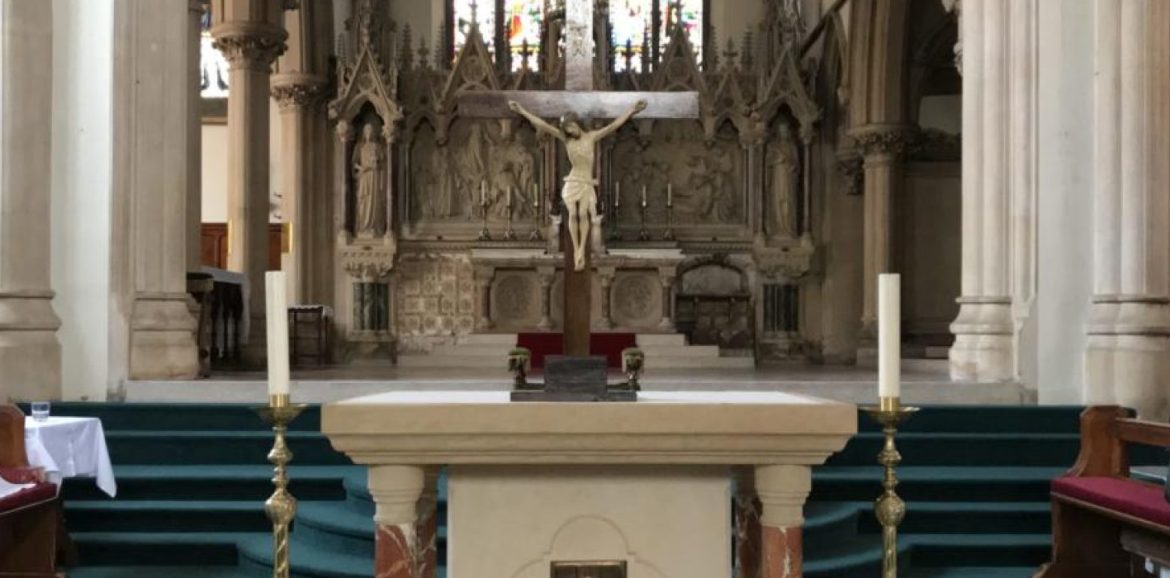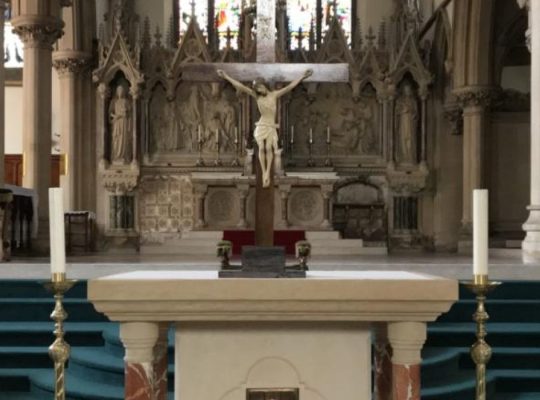‘A new commandment I give to you…..Love one and other as I have loved you.’
All the major events of the Church’s beginnings reported in the Acts of the Apostles are of great interest to us. We need to understand these beginnings to know from whence we have come. They tell of the wondrous and rapid spread of the Gospel, the missionary zeal of the early Christian communities, the conversations and deeds that directed the Church’s life. Also, they show the apostles being led to make decisions that would have weighty consequences for the future. Such was Peter’s baptism of Cornelius and his household. Today we read a resume of Luke’s epilogue to his story.
Peter was making a pastoral visit to some of the communities: thus, he came to Lydda and Joppa. There, on the terrace of a house where he had gone to pray at noontime, he had a strange vision. A kind of huge canvas containing all sorts of animal food forbidden to Jews descended from heaven three times, while a voice invited him to take and eat. While he was wondering about this, messengers from Cornelius arrived. Their master had also had a vision: he had been told to seek a certain Simon called Peter, who was the guest of another Simon, a leather tanner, in Joppa by the seashore. Peter offered the messengers hospitality and, the next day, left with them and some of the faithful from Joppa to go to Caesarea, some thirty miles away, arriving the following day. Cornelius was waiting for them.
Cornelius’ falling to his knees and prostrating himself at Peter’s feet could only have displeased Peter. Yet his surprise must have been even greater when he saw the large audience—relations and close friends— that the centurion had gathered in his house. On the road, the messengers must have told Peter that Cornelius was a God-fearing man. Though a foreigner, he had converted to Judaism, although he had not been circumcised. The account he gave to Peter of his vision was another indication of his piety: it took place at three in the afternoon, while he was praying in his house. Even if there had been no pagans among them, Peter was surrounded by people with whom, as a good Jew, he could have nothing to do with; yet he entered the house! He was able to ignore the interdiction because God had shown him ‘that [he] should not call any person profane or unclean.’ In effect, he was saying, ‘here I am, and I should like to know why you summoned me.’ And the response: ‘Now therefore we are all here in the presence of God to listen to all that you have been commanded by the Lord.’
The response pleased Peter: ‘In truth, I see that God shows no partiality. Rather, in every nation whoever fears him and acts uprightly is acceptable to him.’ He then proclaimed Jesus Christ to them: the beginning of his ministry in Galilee after John’s baptism; his anointing with the Holy Spirit, the good he did everywhere he went; his condemnation and death on a cross; his resurrection on the third day and his appearances to ‘the witnesses chosen by God in advance’; his command to them ‘to preach to the people and testify that he is the one appointed by God as judge of the living and the dead. To him all the prophets bear witness, that everyone who believes in him will receive forgiveness of sins through his name.’
Then an extraordinary thing happened Peter had not finished the words ‘when the Holy Spirit fell upon all who were listening to the word. The circumcised believers who had accompanied Peter were astounded that the gift of the Holy Spirit should have been poured out on the Gentiles also.’ As at the first Pentecost in Jerusalem, these Gentiles of Caesarea were ‘speaking in tongues’ impelled by the Spirit in their hearts, singing songs of praise to God.
The irruption of the Spirit cut short Peter’s speech. How would he have ended it? Would he have said, as he did at Pentecost: ‘Repent and be baptized, every one of you, in the name of Jesus Christ for the forgiveness of your sins; and you will receive the gift of the Holy Spirit?’ We need not ask the question: he was pre-empted by God’s irresistible initiative. ‘Can anyone withhold the water for baptizing these people, who have received the Holy Spirit even as we have?’ And Peter ‘ordered them to be baptized in the name of Jesus Christ.’
One can imagine that the experience had a profound impact on him. When the conversation of the Gentiles led to ‘much debate’ ‘in the Church in Jerusalem, Peter got up and said to them, ‘my brothers, you are well aware that from early days God made his choice among you that through my mouth the Gentiles would hear the word of the Gospel and believe. And God, who knows the heart, bore witness by granting them the Holy Spirit just as he did us. He made no distinction between us and them, for by faith he purified their hearts. Why, then, are you now putting God to the test by placing on the shoulders of the disciples the yoke that neither our ancestors nor we have been able to bear? On the contrary, we believe that we are saved through the grace of the Lord Jesus, in the same way as they.’ This intervention, based on what happened at Caesarea and approved by James, was decisive: the Church’s doors were open to all, without restriction. Such was the considerable impact of Cornelius’ baptism, in which the Spirit had forced Peter’s hand.
Bound now to Christ like branches to a vine, these disciples must bear much fruit and give glory to the Father. After having said as much in images, Jesus, ‘when the hour had come for him to pass from this life to the Father,’ spoke at the Last Supper more clearly about in what the fertility of his disciples consists, what the fruit is that they must bear.
As throughout the whole discourse, Jesus’ thought moves in a spiral, returning to central ideas, from which others spring forth like blossoms on a tree. It is reminiscent of pictures we see in some films of buds rapidly becoming full-blown flowers. The development of Jesus’ thought has its surprises. We imagine that he has finished with a subject when suddenly he returns to it, not only repeating in different forms what he has said before but pronouncing new revelations. The whole forms a large wondrous bouquet. But admiring its exuberance is not enough. One must go over these texts carefully, meditating on them, dwelling on each saying and letting it resonate in oneself, discovering its manifold relationships with other sayings. The more one studies the more one finds endless riches, nuances, and new depths: wonder follows wonder.
At each turn, Jesus speaks of love. This is first of all the Father’s love. (For God is Love). It is at the beginning of the whole process—the ‘economy’ of salvation, and each of its stages. The Father has loved his Son who, in obedience, was made man in order to save the world. ‘Obedient even unto death, death on a cross, Jesus was highly exalted and made Lord, to the glory of the Father, in whose love he dwells.’ Because he loves the Father and shares in his love for the world, he gave his life for us. He has chosen us for his friends, even before we have made the slightest movement toward him. He has revealed to us everything he has learned from the Father, which can be said very simply: God loves us, or, as John says, ‘God is Love.’ Now, Jesus waits for only one thing from us, our loving response manifested not in beautiful professions but in fidelity to his commandments, which can be summed up in one: ‘Love one another as I have loved you.’
‘All the sacred words of the Gospel are filled with the Lord’s commandments. Why, then, does the Lord say that love is his commandment? ‘This is my commandment, love one another.’ Because every commandment flows from love alone; all his precepts are really one, and their sole foundation is that of charity. A tree’s branches all come from the same root, so are all the virtues born from charity alone. The branch of a good work cannot stay green if it is separated from the root of charity.
Therefore, the Lord’s commandments are at the same time many and one: many in the diversity of their works, one in the root of love.
How can we keep this love? The Lord himself tells us: in most of the precepts of his Gospel, he orders his friends to love one another in him, and to love their enemies because of him. Whoever loves his friend in God and his enemy because of God possesses true charity.’ (Gregory the Great. Pope from 590-604)
To love others because one loves God is, for the Christian, the greatest commandment, that which always and everywhere must direct one’s life. As the Eucharist is the ‘source and summit of Christian life,’ so it is the ‘sacrament of love, sign of unity, bond of charity.’ It is the ‘Sacrament of sacraments,’ one in which we are called regularly to share. What privileged people we are!


